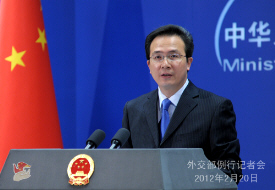There is no consensus on an international arms trade treaty, major weapons exporter China said Wednesday, after it abstained as the UN General Assembly passed the measure by 154 votes to three.
 There is no consensus on an international arms trade treaty, major weapons exporter China said Wednesday, after it abstained as the UN General Assembly passed the measure by 154 votes to three.
There is no consensus on an international arms trade treaty, major weapons exporter China said Wednesday, after it abstained as the UN General Assembly passed the measure by 154 votes to three.
The only votes against the first treaty on the conventional arms trade were from Syria, North Korea and Iran.
The 23 countries abstaining included Russia and China, ranked respectively as the number two and five weapons exporters by the Stockholm International Peace Research Institute think tank, and major buyers Egypt and India.
"We are also in favor of a treaty to regulate arms trade but China is not in favor of pushing through a treaty at the General Assembly," Beijing's foreign ministry spokesman Hong Lei said at a regular press briefing.
China supported reaching a treaty "acceptable by all," he said, but added that insufficient consensus "may expand differences and may even create confrontation which is not helpful to the effectiveness and universality of the treaty".
"It is because of the above that China abstained during the vote," he said.
The first major arms accord since the 1996 Comprehensive Nuclear Test Ban Treaty aims to bring transparency and protection of human rights to the often murky industry.
It covers the trade -- worth an estimated $80 billion a year -- in tanks, armored combat vehicles, large-caliber artillery, combat aircraft, attack helicopters, warships, missiles, missile launchers and small arms.
Countries abiding by the treaty would establish national controls on arms exports, and would have to ensure that weapons being exported would not be used in genocide, war crimes, or by terrorists or organized crime.
The passage of the resolution came after four weeks of talks in July ended in failure, with top producers and buyers battling to chip away at the sales conditions and exclude entire categories from the accord.
Campaign group Amnesty International has highlighted that the five permanent members of the UN Security Council -- Britain, China, France, Russia and the United States -- account for more than half global sales of conventional arms.